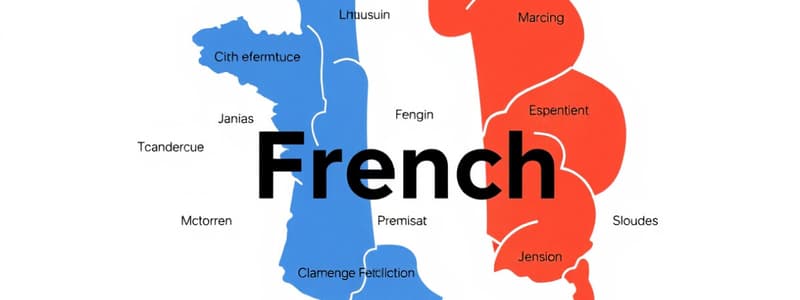Podcast
Questions and Answers
Which term means 'to know' in the context of knowing facts?
Which term means 'to know' in the context of knowing facts?
- croire
- savoir (correct)
- connaître
- comprendre
What is the feminine singular form of 'my'?
What is the feminine singular form of 'my'?
- ton
- mon
- ma (correct)
- mes
Which word translates to 'all' in a masculine singular form?
Which word translates to 'all' in a masculine singular form?
- toutes
- chaque
- lui
- tout (correct)
Which term is used to express 'but' in French?
Which term is used to express 'but' in French?
What does the word 'vivant' mean?
What does the word 'vivant' mean?
Which word means 'to have to' or 'must'?
Which word means 'to have to' or 'must'?
Which of these is the translation for 'I'?
Which of these is the translation for 'I'?
What is the French term for 'cold'?
What is the French term for 'cold'?
Which word means 'to run'?
Which word means 'to run'?
What does 'jeune' translate to in English?
What does 'jeune' translate to in English?
Which phrase means 'to eat'?
Which phrase means 'to eat'?
Which word refers to 'to study'?
Which word refers to 'to study'?
What does 'triste' mean?
What does 'triste' mean?
Which term is used for 'with'?
Which term is used for 'with'?
Flashcards are hidden until you start studying
Study Notes
French Vocabulary and Grammar
-
Articles:
- le - masculine singular definite article "the"
- la - feminine singular definite article "the"
- un - masculine singular indefinite article "a, an"
- une - feminine singular indefinite article "a, an"
-
Pronouns:
- il - he, it (masculine)
- elle - she, it (feminine)
- nous - we, us
- vous - you (formal or plural)
- tu - you (informal)
-
Common Verbs:
- être - to be
- avoir - to have
- faire - to do, to make
- aller - to go
- voir - to see
- venir - to come
- savoir - to know
- vouloir - to want
-
Negation:
- pas - not
- ne - not (used in negation)
-
Conjunctions:
- et - and
- mais - but
- que - that, than, as
Descriptive Adjectives
- Common adjectives describing states or qualities:
- bien - well, good
- très - very
- beaucoup - a lot, many
- toujours - always
- jamais - never
- nouveau - new (masculine), nouvelle - new (feminine)
- vieux - old (masculine), vieille - old (feminine)
- grand - big, tall
- petit - small, little
- fort - strong
- faible - weak
- heureux - happy
Functional Words
-
Prepositions:
- à - to, at, in
- de - of, from
- en - in, into, by
- sur - on, upon, over
- avec - with
- pour - for, in order to
- dans - in, into
-
Adverbs:
- seulement - only
- peut-être - perhaps, maybe
- encore - again, still
Personal Pronouns and Possessives
-
Personal pronouns:
- je - I
- lui - him, it (masculine)
-
Possessive adjectives:
- mon - my (masculine singular)
- ma - my (feminine singular)
- notre - our (singular)
- votre - your (formal or plural)
Additional Vocabulary
-
Common verbs for daily actions:
- manger - to eat
- boire - to drink
- travailler - to work
- étudier - to study
- jouer - to play
- regarder - to watch, look at
- écouter - to listen
-
Emotional states and conditions:
- triste - sad
- malade - sick
- fatigué - tired
- riche - rich
- pauvre - poor
Verb Conjugations
- Important verbs related to existence and states:
- devoir - to have to, must
- pouvoir - to be able to, can
- croire - to believe
- comprendre - to understand
- demander - to ask, request
Colors and Sizes
-
Colors:
- rouge - red
- bleu - blue
- vert - green
- jaune - yellow
- noir - black
- blanc - white
-
Size adjectives:
- haut - high
- bas - low
- large - wide, broad
- étroit - narrow
Understanding these foundational elements of French will greatly enhance conversational fluency and comprehension.
Studying That Suits You
Use AI to generate personalized quizzes and flashcards to suit your learning preferences.




